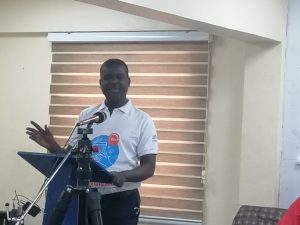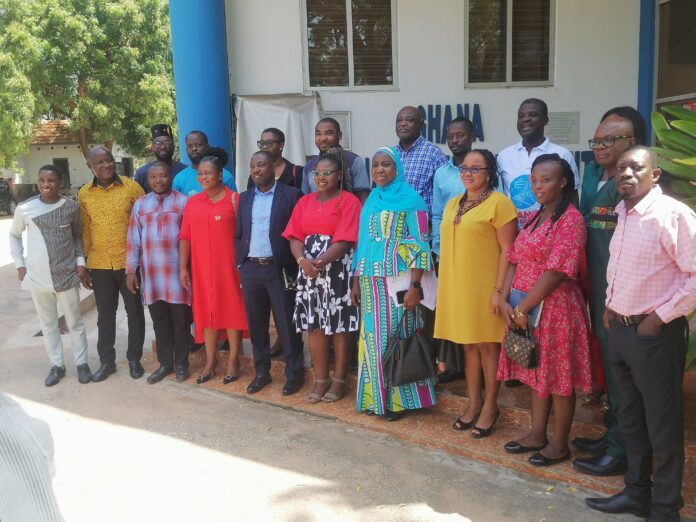
Group picture of Stakeholders & GWJN members
Story by: Ishmael Barfi
According to the Ghana Water, Sanitation, and Hygiene (WASH) Journalists Network (GWJN), the practice of open defecation in most regions across the country is a result of poverty.
To them, due to insufficient funds or means to have a place of convenience (toilet) in homes, many resorts to open defecation.
These practices do not promote good sanitation practices but hinder the attainment of Goal 6 of the Sustainable Development Goals (SDGs).
This was disclosed during the official premiering of a documentary produced by the Ghana Water, Sanitation and Hygiene (WASH) Journalists Network (GWJN) as part of its efforts to help eradicate open defecation as well as achieve SDG 6.
The documentary on the State of Open Defecation and Access to Improved Sanitation in Ghana held in Accra was based on research conducted in four regions where open defecation is a norm.

Stakeholders at the high table
Poverty during the documentary premiering was a key factor in people defecating in open spaces such as beaches, refuse dumping sites, etc.
This is due to the inability to afford a place of convenience at home as well as paying for it at the public toilets in their vicinity.
The Documentary produced through collaborative efforts within the Water Sanitation and Hygiene (WASH) sector, seeks to unearth the underlying factors that make it difficult for Ghanaians to access improved sanitation, and why about 17.7 percent of the population resort to open defecation.
Furthermore, it highlights some critical issues that need the attention of the public and other stakeholders to take action before they affect the health and well-being of ordinary Ghanaians.
These key issues included poverty, education, awareness creation, behavioral change, and sustained investment in water and sanitation infrastructure.

GWJN Coordinator, Mr. Justice Lee Adoboe
Addressing his colleagues and stakeholders, the GWJN Coordinator, Mr. Justice Lee Adoboe explained that, the mission of GWJN Is to use their reporting skills to tell relevant stories in the WASH sector to generate the needed discussions for positive responses from duty bearers and bring the necessary interventions.
Therefore, the half hour documentary “ The State of Open Defecation and Access to Improved Sanitation in Ghana is one of such ways.
Though the half hour documentary provides various themes, poverty, which has been one of the major barriers to people accessing other essential wants and goods, was pivotal.
“Unfortunately, poverty is also a major driver of open defecation which is a major blot on our national conscience”, he bemoaned.
Meanwhile he acknowledged that, water and Sanitation are two critical factors to health and well-being of mankind as well as a key component in the attainment of many of the Sustainable Development Goals (SDGs).
In that regard, he disclosed that, the 2021 Housing and Population Census data showed that, where the coverage of basic water is improved to about 88 percent, households with improved sanitation stood at 25 percent.

Group picture of Stakeholders & GWJN members
This he said shows a strong correlation between access to improved household toilets and the level of open defecation.
“The slow pace of improvement in the access to sanitation (25 percent) compared to that of – water (88 percent) can only point to stronger underlying factors hampering access to improved sanitation in the country”, Justice Adoboe reiterated.
Therefore he was of hope that, the documentary comes in to aid the other advocacy tools in the sector to make a strong case for restrategizing to implement effective policies that will create the needed access to improved Sanitation in every nook and cranny of the country, thereby helping to end open defecation.
Giving her solidarity message, the Director of Community Water and Sanitation Agency (CWSA) Safuratu Muhammed Andani reiterated the need for behavioral change and acknowledged that, the best investment the Government of Ghana can offer its citizenry is to invest massively in water and sanitation.

World Bank representative Harold Esserko
Representing the Development Partners, World Bank representative Harold Esserko expressed displeasure with the rise of individuals practicing open defecation.
Revealing that Development Partners are tirelessly working with the Ministry of Sanitation and Water Resources and other crucial stakeholders to halt the menace of open defecation in the country.
One of such projects is the Greater Accra Metropolitan Area (GAMA) Sanitation and Water Project implemented by the various MMDAs under the World Bank grant of US$150 million to support the Government of Ghana’s efforts to increase access to improved sanitation and improved water supply in the GAMA, with emphasis on low-income communities and to strengthen management of environmental sanitation in the GAMA.
And under this project, a household can have a bio-digester toilet constructed at an affordable price as one of the measures to curb open defecation in the Metropolitan, Municipal and District Assemblies.
Open defecation refers to the practice of defecating in fields, forests, bushes, bodies of water, shores, or other open spaces.
Open defecation can pollute the environment and cause health problems and diseases. High levels of open defecation are linked to high child mortality, poor nutrition, poverty, and large disparities between rich and poor
Source: www.thenewindependentonline.com








